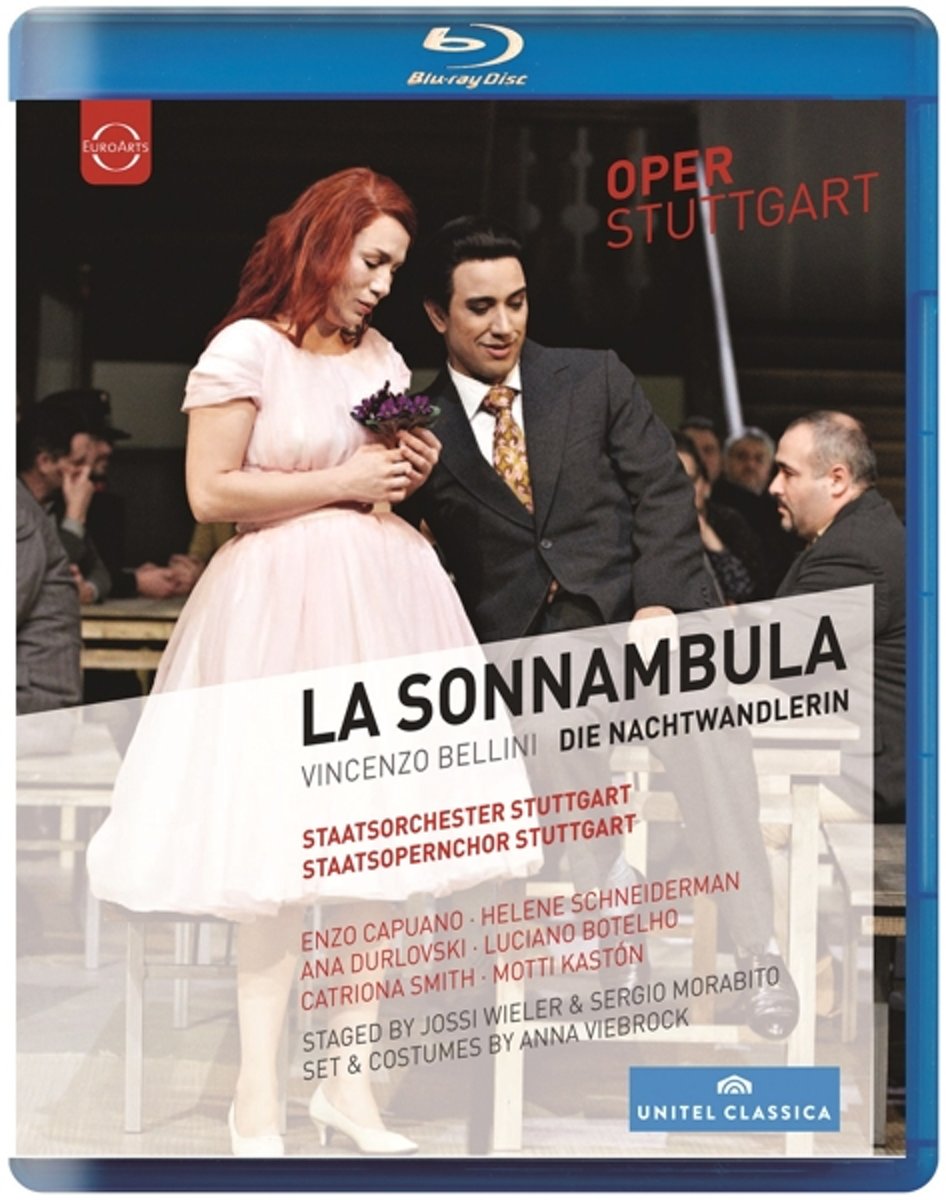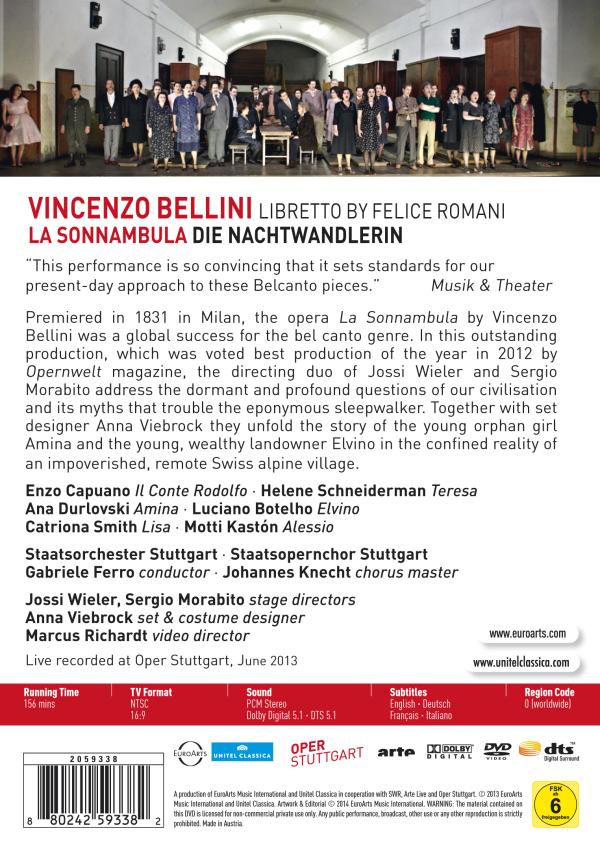

Bellini 💓 La Sonnambula opera to a libretto by Felice Romani. Directed 2013 by Jossi Wieler and Sergio Morabito at Oper Stuttgart. Stars Ana Durlovski (Amina), Luciano Botelho (Elvino), Helene Schneiderman (Teresa), Catriona Smith (Lisa), Enzo Capuano (Il Conte Rodolfo), Motti Kasón (Alessio), Juan Palo Marin (Un notario), and Antje Albruschat (La Strige [ghost in English]). Gabriele Ferro conducts the Staatsorchestra Stuttgart and the Staatsoperchor Stuttgart (Chorus Master Johannes Knecht). Sets and costumes by Anna Viebrock; lighting design by Reinhard Traub; dramatic advisors were Sergio Morabito and Angela Beuerle. Directed for TV by Marcus Richardt. Sung in Italian. Released 2014, disc has 5.1 dts-HD Master Audio sound. Grade: A
Perhaps one can divide productions of La Sonnambula into two camps. In the romantic camp, the Count has no connection to Amina, the village ghost is just Amina sleepwalking, and at the end everybody gets the love they need to live happily ever after. The La Fenici version belongs in the romantic camp. In the realistic camp, the Count is Amina's father who seduced and abandoned Amina's mother when he was young, the village ghost is Amina's mother, Amina gets her man, but everybody will spend the rest of their lives struggling with their still unresolved problems. Subject title is in the realistic camp.
Here we see Lisa (Catriona Smith) in the foreground. Lisa is the owner of a rundown inn and banquet hall in a poor Swiss farming village. Her employee, Alessio (Motti Kasón), has put together a chorus from the whole region to serenade Amina, who is to be married tomorrow to Elvino, the wealthiest farmer around. Alessio is madly in love with Lisa. The only problem is that Lisa is still in love with Elvino, with whom she once had a romantic relationship:
Here's a better picture of Alessio. In the center is Teresa (Helene Schneiderman), Amina's foster mother. When Amina's unmarried mother was pregnant with Amina, she refused to name the father, saying only that he was dead. When Amina's mother died in childbirth, Amina came into the world with no name. Teresa took in and raised the baby girl (I'm making some of this up):
Amina (Ana Durlovsky) arrives at the inn to sign into the marriage contract. Shy, insecure, and awkward, Amina even has trouble walking across the room. But her beauty and aura of vulnerability would make her irresistible to any man who deems himself to be chivalrous:
By local custom, everyone looks away as Amina slips into her wedding dress and shows her joy. Lisa can only chew her cud:
The notary arrives and the groom, Elvino (Luciano Botelho), announces his wedding gifts (Amina has only her heart to give):
Now we are starting to see why Ana Durlovsky won awards for this performance. To hear why she won awards, you have to get the disc:
The wedding celebrations are interrupted when an stranger arrives at the inn. He is Count Rodolfo, Amina's father, who was banished by his father, the old Count, because of Rodolfo's indiscretion with Amina's mother. But now the old Count has been dead 4 years, and Rodolfo hopes to visit the village incognito:
Rodolfo is still a womanizer, and any pretty girl catches his eye:
There's a powerful attraction between Rodolfo and Amina; but, of course, neither knows why:
Elvino is beside himself with jealousy as he sees Amina warm up to the stranger. A huge young-lovers' fight follows in which Elvino's own insecurities are revealed. With the appearance of this new rival, Biology tells Elvino that he must claim Amina now. But Amina, being a true bel canto heroine, knows that she must go to the alter a virgin. This fabulous scene ends with a truce; the wedding will be tomorrow morning:
Rodolfo takes a room in the inn. Lisa throws herself at the Count, but her room service is interrupted when Amina arrives in sleepwalking mode. Amina thinks the Count is Elvino. Rodolfo has a good heart, but little will power:
According to my Grove Book of Operas, Felici Romani wanted to portray Rodolfo as Amina's father. Bellini didn't go for it. He just wanted to write bel canto operas—not Greek tragedies. But here we have a case of accidental incest in progress with the girl's mother looking on:
But before things get completely out of control, Lisa drags Elvino into Rodolfo's room to see Amina's infidelity, and the villagers show up to boot (to give the Count a serenade). When Amina wakes, she's in a state of total confusion and shock:
Lisa's gambit almost works. Elvino is fed up with female problems. He's getting married tomorrow to somebody, even if it's Lisa:
But now the sleepwalker shows up again. As a true bel canto heroine, Amina is willing to sacrifice herself to make her sweetheart happy. Note the blood on her dress; Amina has injured herself while sleepwalking:
Rodolfo, saved by fate from yet another indiscretion, is determined to rehabilitate Amina's honor:
Now the young lovers are reconciled again, and Lisa leaves with two suitcases:
The ghost appears again, and this time Rodolfo recognizes her:
Amina gets her guy. Good thing he's rich, because Elvino will be dealing the his young wife's damaged mental an physical condition for the rest of his life. And Elvino has his own problems to overcome as well. Alessio will have to run the Inn until Lisa slinks back and begrudgingly settles for him. Teresa will wither away as an old maid. Rodolfo will have to figure out how to rid the village and himself of the ghost. Stage directors Jossi Wieler and Sergio Morabito have come up with a new opera genre: verisimo bel canto Greek tragedy. And Ana gets to sing one last really high note:
This production was deemed "Opera of the Year" by Opernwelt magazine. Mike Ashman in the May 2014 Gramophone at page 90 praised this highly for Durlovski's singing and acting. Ashman also liked the directing, sound, and video. He concludes that this "darker version" from Stuttgart is even better than the Fenici "romantic" Sonnambula that Ashman also admires.
I give this an A for fabulous singing and acting and a psychological approach that rationalizes logical problems in the libretto. Everything else is on the money too with good orchestra conducting and playing, a fine chorus, and good SQ, PQ, and video content. To me this is an A+ title, but I think many others might find this realistic take on La Sonnambula is not perfectly in tune with the basic romantic and idealistic notions of bel canto.
























